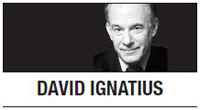[David Ignatius] NK crisis may resume after Olympics
By David IgnatiusPublished : Jan. 12, 2018 - 17:23
 Sometimes diplomacy is the art of going in two directions at once, and the Trump administration seems to have chosen that sweet spot of ambiguity, for now, in managing its continuing confrontation with North Korea.
Sometimes diplomacy is the art of going in two directions at once, and the Trump administration seems to have chosen that sweet spot of ambiguity, for now, in managing its continuing confrontation with North Korea. President Trump has paused his “Little Rocket Man” rhetoric and boasts about the size of his own nuclear button. He's insisting this week that talk of a US military strike (which he had encouraged) is “completely wrong,” and calling for discussions with North Korea “under the right circumstances.”
A fragile detente seems to have begun. North Korea hasn’t tested weapons in more than a month and is talking to the South. North Korean athletes and spectators will attend the PyeongChang Olympics. The US has delayed scheduled military exercises until after the last gold medal is awarded. Call it speed skater diplomacy, if you like; but the table for negotiations has at least been set.
Trump administration diplomacy is like the oft-quoted description of New England weather: If you don't like it, wait awhile. But at least through late February, we’re likely to experience a thaw on the Korean Peninsula, and it‘s interesting to explore what it means.
Trump is already taking credit for the success of “peace through strength,” and you can’t dismiss his argument that firmness brought some benefits. But the real winners in this round are probably North Korean leader Kim Jong-un, who pivoted toward diplomacy in a Jan. 1 speech, and South Korean President Moon Jae-in, who responded positively to the overtures. Secretary of State Rex Tillerson probably gets a “save,” but not a win, for persisting with his diplomatic agenda despite periodic thunderbolts from Trump.
The problem with this Olympic peace parade is that nothing has really been resolved. Once the games have ended, all the same problems will exist. If the US resumes military exercises, North Korea may go back to testing missiles and bombs. “We have avoided escalation of tension,” said one US official, but in several months, “we‘re back to square one.”
Ideally, the next step would be direct US-North Korean talks. A senior State Department official told me he hopes face-to-face talks will start before the Olympics end; the US will characterize the goal as eventual denuclearization of the Korean Peninsula. The North may offer a different formula, but Washington probably won’t care so long as the other side shows up. There's no sign yet that it will, however.
The State Department official explains that the conversation with Pyongyang can “start at the edges,” with each country describing how it sees the future, and then “work toward the center,” meaning denuclearization. “The Olympics themselves might be the perimeter” from which talks start, says the official.
Trump argues that his nuclear brinkmanship over the past year has worked. “Does anybody really believe that talks and dialogue would be going on between North and South Korea right now if I wasn’t firm, strong and willing to commit our total ‘might’ against the North,” he tweeted Jan. 4. Trump famously likes to be flattered, and Moon this week wisely lauded his “huge contribution” to peace talks.
Who has blinked here? It's hard to argue that it’s Kim. The mutual stand-down for the Olympics looks very much like the “freeze for freeze” approach that Russia and China were recommending last year, although US officials resist the characterization.
For all Trump's bluster and self-congratulation, the past month’s diplomacy really has been a Korean show, with Kim and Moon both showing considerable finesse. Kim gave his New Year's speech with the confidence of a member of the nuclear club, but he was also deferential toward Seoul. Moon responded avidly, but he also kept faith with Washington by stressing that diplomacy must eventually encompass denuclearization.
What the Trump administration can take credit for is building a robust international coalition around the demand that North Korea must eventually give up its nuclear weapons. Russia and China have joined in a series of UN Security Council resolutions sanctioning North Korea, and this slow squeeze is beginning to hurt. Diplomats report the beginnings of food shortages in North Korea, and China is sending some North Korean workers back home.
Tillerson will meet in Canada next week with diplomats from countries that sent troops to fight the Korean War nearly 70 years ago. That gathering is meant to signal global solidarity and resolve. But it will also highlight the failure of the US-led coalition, so far, to stop North Korea from becoming a de facto nuclear power.
A pause for the Olympics, and then, alas, the crisis resumes.
By David Ignatius
David Ignatius can be reached via Twitter: @IgnatiusPost.--Ed.
(Washington Post Writers Group)







![[Graphic News] More Koreans say they plan long-distance trips this year](http://res.heraldm.com/phpwas/restmb_idxmake.php?idx=644&simg=/content/image/2024/04/17/20240417050828_0.gif&u=)
![[KH Explains] Hyundai's full hybrid edge to pay off amid slow transition to pure EVs](http://res.heraldm.com/phpwas/restmb_idxmake.php?idx=644&simg=/content/image/2024/04/18/20240418050645_0.jpg&u=20240419100350)





![[From the Scene] Monks, Buddhists hail return of remains of Buddhas](http://res.heraldm.com/phpwas/restmb_idxmake.php?idx=652&simg=/content/image/2024/04/19/20240419050617_0.jpg&u=20240419175937)

![[KH Explains] Hyundai's full hybrid edge to pay off amid slow transition to pure EVs](http://res.heraldm.com/phpwas/restmb_idxmake.php?idx=652&simg=/content/image/2024/04/18/20240418050645_0.jpg&u=20240419100350)

![[Today’s K-pop] Illit drops debut single remix](http://res.heraldm.com/phpwas/restmb_idxmake.php?idx=642&simg=/content/image/2024/04/19/20240419050612_0.jpg&u=)